FILE - In this Sept. 24, 2020, file photo, cemetery workers place the coffin containing the remains of Jose de Arimateia, 65, who died from COVID-19 complications, into a niche at the municipal cemetery in Nova Iguacu, Brazil. The worldwide death toll from the coronavirus eclipsed 1 million, nine months into a crisis that has devastated the global economy, tested world leaders' resolve, pitted science against politics and forced multitudes to change the way they live, learn and work. (AP Photo/Silvia Izquierdo, File)
The Associated Press
NEW DELHI (AP) - The worldwide death toll from the coronavirus has eclipsed 1 million, nine months into a crisis that has devastated the global economy, tested world leaders' resolve, pitted science against politics and forced multitudes to change the way they live, learn and work.
'œIt's not just a number. It's human beings. It's people we love,'ť said Dr. Howard Markel, a professor of medical history at the University of Michigan who has advised government officials on containing pandemics and lost his 84-year-old mother to COVID-19 in February.
'œIt's our brothers, our sisters. It's people we know,'ť he added. 'œAnd if you don't have that human factor right in your face, it's very easy to make it abstract.'ť
The bleak milestone, recorded on Monday in the U.S. by Johns Hopkins University, is greater than the population of Jerusalem or Austin, Texas. It is 2 1/2 times the sea of humanity that was at Woodstock in 1969. It is more than four times the number killed by the 2004 earthquake and tsunami in the Indian Ocean.
Even then, the figure is almost certainly a vast undercount because of inadequate or inconsistent testing and reporting and suspected concealment by some countries.
And the number continues to mount. Nearly 5,000 deaths are reported each day on average. Parts of Europe are getting hit by new outbreaks, and experts fear a second wave in the U.S., which accounts for about 205,000 deaths, or 1 out of 5 worldwide. That is far more than any other country, despite America's wealth and medical resources.
'œI can understand why ... numbers are losing their power to shock, but I still think it's really important that we understand how big these numbers really are,'ť said Mark Honigsbaum, author of 'œThe Pandemic Century: One Hundred Years of Panic, Hysteria and Hubris.'ť
The global toll includes people like Joginder Chaudhary, who was his parents' greatest pride, raised with the little they earned farming a half-acre plot in central India to become the first doctor from their village.
After the virus killed the 27-year-old Chaudhary in late July, his mother wept inconsolably. With her son gone, Premlata Chaudhary said, how could she go on living? Three weeks later, on Aug. 18, the virus took her life, too. All told, it has killed more than 96,000 in India.
'œThis pandemic has ruined my family,'ť said the young doctor's father, Rajendra Chaudhary. 'œAll our aspirations, our dreams, everything is finished.'ť
When the virus overwhelmed cemeteries in the Italian province of Bergamo last spring, the Rev. Mario Carminati opened his church to the dead, lining up 80 coffins in the center aisle. After an army convoy carted them to a crematory, another 80 arrived. Then 80 more.
Eventually the crisis receded and the world's attention moved on. But the pandemic's grasp endures. In August, Carminati buried his 34-year-old nephew.
'œThis thing should make us all reflect. The problem is that we think we're all immortal,'ť the priest said.
The virus first appeared in late 2019 in patients hospitalized in the Chinese city of Wuhan, where the first death was reported on Jan. 11. By the time authorities locked down the city nearly two weeks later, millions of travelers had come and gone. China's government has come in for criticism that it did not do enough to alert other countries to the threat.
Government leaders in countries like Germany, South Korea and New Zealand worked effectively to contain it. Others, like U.S. President Donald Trump and Brazil's Jair Bolsonaro, dismissed the severity of the threat and the guidance of scientists, even as hospitals filled with gravely ill patients.
Brazil has recorded the second most deaths after the U.S., with about 142,000. India is third and Mexico fourth, with more than 76,000.
The virus has forced trade-offs between safety and economic well-being. The choices made have left millions of people vulnerable, especially the poor, minorities and the elderly.
With so many of the deaths beyond view in hospital wards and clustered on society's margins, the milestone recalls the grim pronouncement often attributed to Soviet dictator Josef Stalin: One death is a tragedy, millions of deaths are a statistic.
The pandemic's toll of 1 million dead in such a limited time rivals some of the gravest threats to public health, past and present.
It exceeds annual deaths from AIDS, which last year killed about 690,000 people worldwide. The virus's toll is approaching the 1.5 million global deaths each year from tuberculosis, which regularly kills more people than any other infectious disease.
But 'œCOVID's grip on humanity is incomparably greater than the grip of other causes of death,'ť said Lawrence Gostin, a professor of global health law at Georgetown University. He noted the unemployment, poverty and despair caused by the pandemic, and deaths from myriad other illnesses that have gone untreated.
For all its lethality, the virus has claimed far fewer lives than the so-called Spanish flu, which killed an estimated 40 million to 50 million worldwide in two years, just over a century ago.
That pandemic came before scientists had microscopes powerful enough to identify the enemy or antibiotics that could treat the bacterial pneumonia that killed most of the victims. In the U.S., the Spanish flu killed about 675,000. But most of those deaths did not come until a second wave hit over the winter of 1918-19.
Up to now, the disease has left only a faint footprint on Africa, well shy of early modeling that predicted thousands more deaths.
But cases have recently surged in countries like Britain, Spain, Russia and Israel. In the United States, the return of students to college campuses has sparked new outbreaks. With approval and distribution of a vaccine still probably months away and winter approaching in the Northern Hemisphere, the toll will continue to climb.
'œWe're only at the beginning of this. We're going to see many more weeks ahead of this pandemic than we've had behind us,'ť Gostin said.
___
Geller reported from New York. Nicole Winfield in Rome contributed to this story.
--
Follow AP's pandemic coverage at http://apnews.com/VirusOutbreak and https://apnews.com/UnderstandingtheOutbreak
FILE - In this July 7, 2020, file photo, Spencer Cushing, 29, tends to David Feinour, a 71-year-old COVID-19 patient, at St. Jude Medical Center in Fullerton, Calif. The worldwide death toll from the coronavirus eclipsed 1 million, nine months into a crisis that has devastated the global economy, tested world leaders' resolve, pitted science against politics and forced multitudes to change the way they live, learn and work. (AP Photo/Jae C. Hong, File)
The Associated Press
In this October 2019 photo provided by Bharat Sangwan, Joginder Chaudhary, left, and his friend and colleague Sangwan volunteer at a medical camp for women. After the virus killed the 27-year-old Chaudhary in late July 2020, his mother wept inconsolably. With her son gone, Premlata Chaudhary said, how could she go on living? Three weeks later, on Aug. 18, the virus took her life, too - yet another number in an unrelenting march toward a woeful milestone.(Courtesy of Bharat Sangwan via AP)
The Associated Press
FILE - In this March 28, 2020, file photo, Don Marcello Crotti, left, blesses the coffins with Don Mario Carminati in the San Giuseppe church in Seriate, Italy. TThe worldwide death toll from the coronavirus eclipsed 1 million, nine months into a crisis that has devastated the global economy, tested world leaders' resolve, pitted science against politics and forced multitudes to change the way they live, learn and work. (AP Photo/Antonio Calanni, File)
The Associated Press
FILE - In this July 11, 2020, file photo, mourners carry out the remains of loved ones following the blessing of the ashes of Mexicans who died from COVID-19 at St. Patrick's Cathedral in New York. The worldwide death toll from the coronavirus eclipsed 1 million, nine months into a crisis that has devastated the global economy, tested world leaders' resolve, pitted science against politics and forced multitudes to change the way they live, learn and work. (AP Photo/Eduardo Munoz Alvarez, File)
The Associated Press
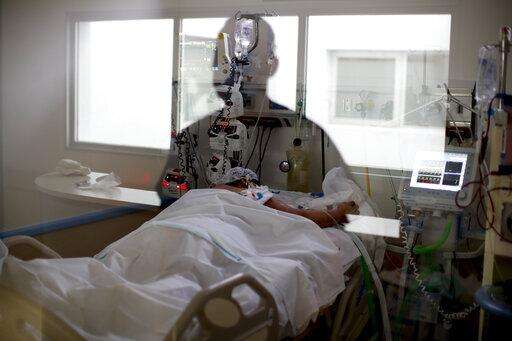
FILE - In this Sept. 15, 2020, file photo, an intensive care unit nurse, reflected in a window, looks in on a COVID-19 patient, at the El Cruce Dr. Nestor Carlos Kirchner Hospital, on the outskirts of Buenos Aires, Argentina. The worldwide death toll from the coronavirus eclipsed 1 million, nine months into a crisis that has devastated the global economy, tested world leaders' resolve, pitted science against politics and forced multitudes to change the way they live, learn and work. (AP Photo/Natacha Pisarenko, File)
The Associated Press
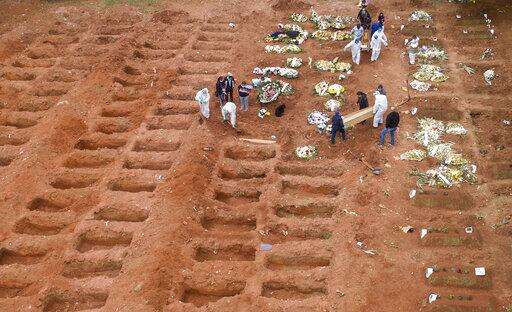
FILE - In this July 15, 2020, file photo, cemetery workers in protective clothing bury three victims of COVID-19 at the Vila Formosa cemetery in Sao Paulo, Brazil. The worldwide death toll from the coronavirus eclipsed 1 million, nine months into a crisis that has devastated the global economy, tested world leaders' resolve, pitted science against politics and forced multitudes to change the way they live, learn and work. (AP Photo/Andre Penner, File)
The Associated Press
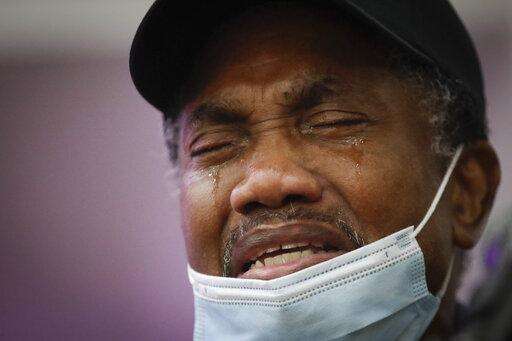
FILE - In this July 21, 2020, file photo, Samuel Nunez cries as he eulogizes his daughter Lydia Nunez, who died from COVID-19, during a funeral service in memory of her at the Metropolitan Baptist Church in Los Angeles. The worldwide death toll from the coronavirus eclipsed 1 million, nine months into a crisis that has devastated the global economy, tested world leaders' resolve, pitted science against politics and forced multitudes to change the way they live, learn and work. (AP Photo/Marcio Jose Sanchez)
The Associated Press
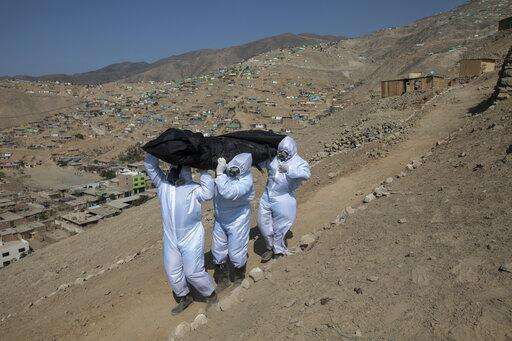
FILE - In this May 8, 2020, file photo, Piedrangel funeral home workers Luis Zerpa, Luis Brito, center, and Jhoan Faneite, right, from Venezuela, carry the corpse to the hearse of Marcos Espinoza, 51, who died from symptoms of coronavirus in Pachacamac, outskirts from Lima, Peru. The worldwide death toll from the coronavirus eclipsed 1 million, nine months into a crisis that has devastated the global economy, tested world leaders' resolve, pitted science against politics and forced multitudes to change the way they live, learn and work. (AP Photo/Rodrigo Abd, File)
The Associated Press
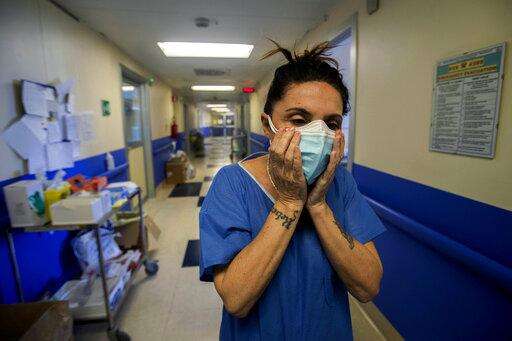
FILE - In this April 10, 2020, file photo, nurse Cristina Settembrese fixes two masks to her face during her work shift in the COVID-19 ward at the San Paolo hospital in Milan, Italy. The worldwide death toll from the coronavirus eclipsed 1 million, nine months into a crisis that has devastated the global economy, tested world leaders' resolve, pitted science against politics and forced multitudes to change the way they live, learn and work. (AP Photo/Luca Bruno, File)
The Associated Press
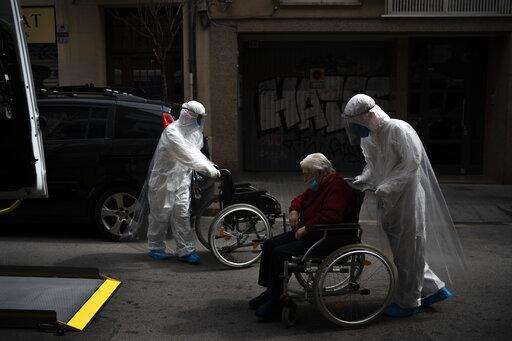
FILE - In this April 11, 2020, file photo, a volunteer of the Spanish NGO Open Arms pushes in a wheelchair an elderly resident of a nursing home with coronavirus symptoms to a Hospital in Barcelona, Spain. The worldwide death toll from the coronavirus eclipsed 1 million, nine months into a crisis that has devastated the global economy, tested world leaders' resolve, pitted science against politics and forced multitudes to change the way they live, learn and work. (AP Photo/Felipe Dana, File)
The Associated Press
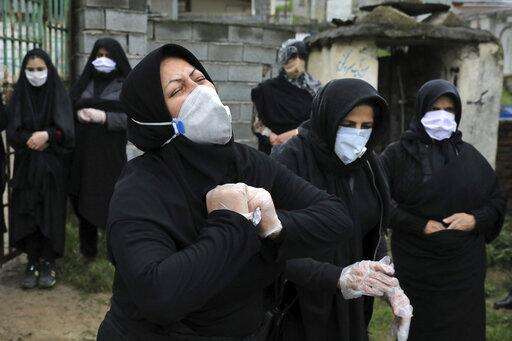
FILE - In this April 30, 2020, file photo, relatives of a victim who died from the coronavirus, mourn at the gate of a cemetery, in the outskirts of the city of Babol, in north of Iran. The worldwide death toll from the coronavirus eclipsed 1 million, nine months into a crisis that has devastated the global economy, tested world leaders' resolve, pitted science against politics and forced multitudes to change the way they live, learn and work. (AP Photo/Ebrahim Noroozi, File)
The Associated Press
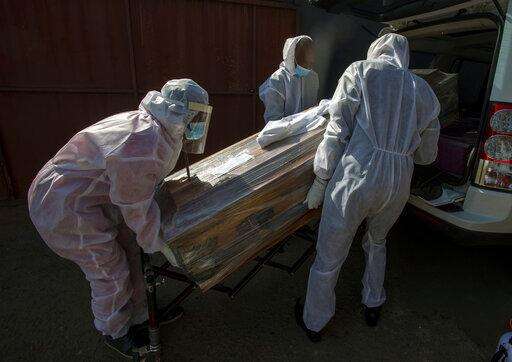
FILE - In this July 21 2020, file photo, funeral home workers in protective suits carry the coffin of a woman who died from COVID-19 into a hearse in Katlehong, near Johannesburg, South Africa. The worldwide death toll from the coronavirus eclipsed 1 million, nine months into a crisis that has devastated the global economy, tested world leaders' resolve, pitted science against politics and forced multitudes to change the way they live, learn and work. (AP Photo/Themba Hadebe, File)
The Associated Press
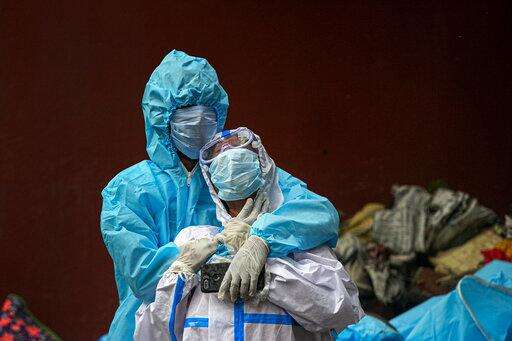
FILE - In this Sept. 10, 2020, file photo, a woman wearing white protective gear, foreground, mourns after taking a glimpse of her husband's body, a victim of COVID 19, at a cremation site in Gauhati, India. The worldwide death toll from the coronavirus eclipsed 1 million, nine months into a crisis that has devastated the global economy, tested world leaders' resolve, pitted science against politics and forced multitudes to change the way they live, learn and work. (AP Photo/Anupam Nath, File)
The Associated Press
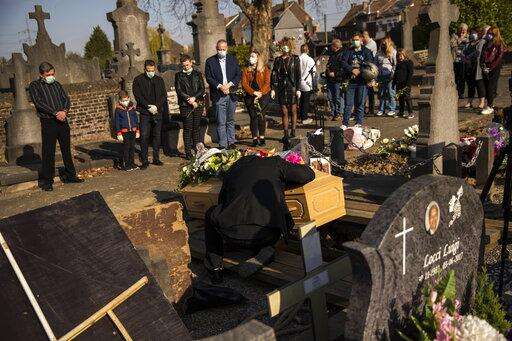
FILE - In this April 8, 2020, file photo, a relative of Margodt Genevieve, who died due to COVID-19, grieves over her coffin during her funeral ceremony at the Montignies cemetery in Charleroi, Belgium. The worldwide death toll from the coronavirus eclipsed 1 million, nine months into a crisis that has devastated the global economy, tested world leaders' resolve, pitted science against politics and forced multitudes to change the way they live, learn and work. (AP Photo/Francisco Seco, File)
The Associated Press